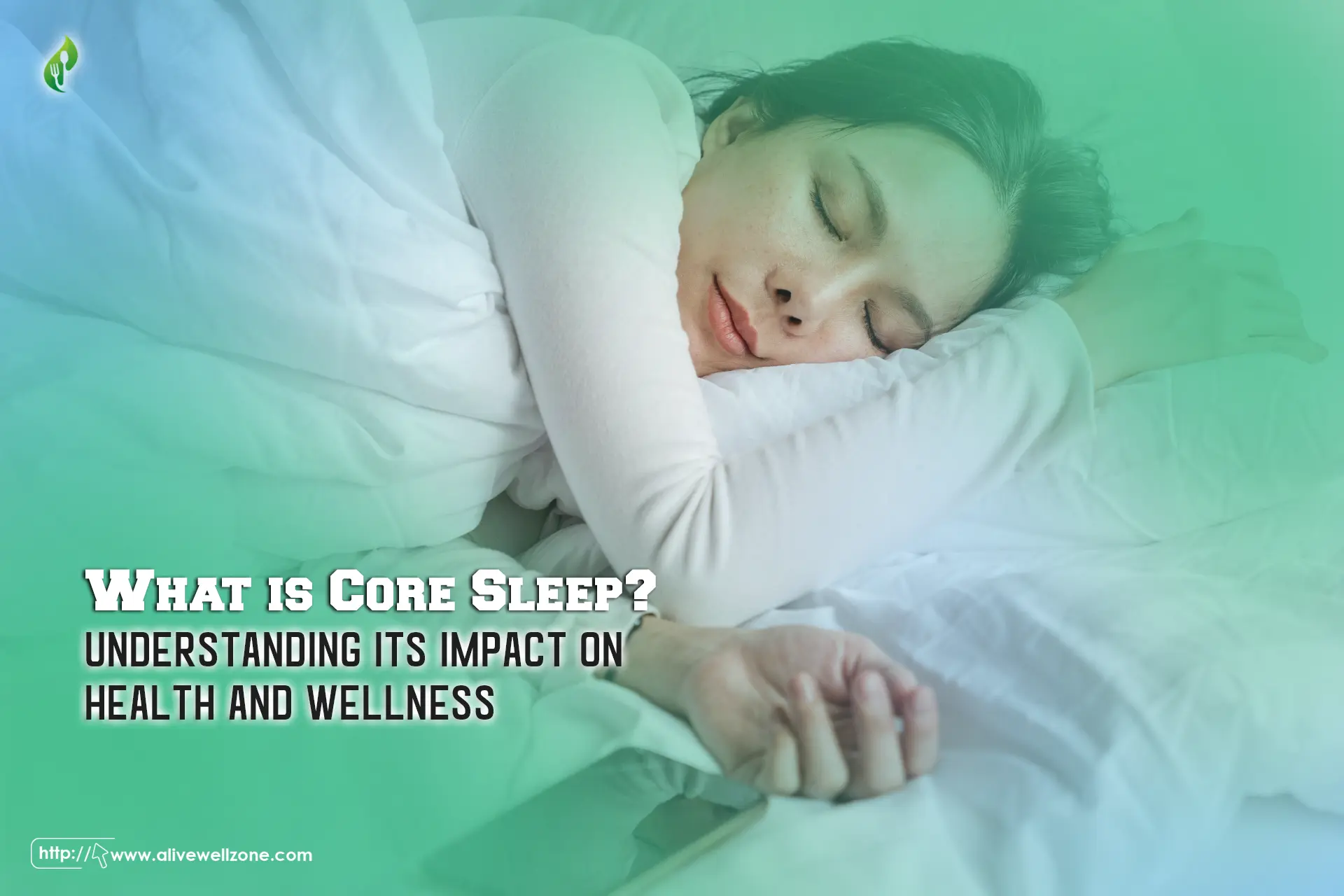
Are you constantly battling fatigue, brain fog, and a lack of energy despite getting enough sleep? If so, you might be experiencing the effects of inadequate core sleep. Often, we overlook this important aspect of our sleep cycle, which can have a profound effect on our health.
Core sleep encompasses stages such as Deep Sleep and REM, vital for physical restoration and memory consolidation. Adults require 7 to 9 hours, but stress and lifestyle can impact sleep quality. The quality of your core sleep affects your overall well-being.
Today, we’ll explore what is core sleep, its importance, and practical strategies to enhance the quality of your core sleep. Understanding this key aspect of sleep unlocks the path to improved energy levels, sharper focus, and enhanced well-being.
What is Core Sleep?
Core sleep is the crucial sleep phase lasting 4 to 6 hours nightly, vital for brain function and health. It includes REM and N4 deep sleep stages, important for repairing tissues, solidifying memories, and balancing hormones.
What Are the Stages of Sleep?
During a night’s rest, you cycle through four distinct sleep stages. These include three stages of non-rapid-eye-movement (NREM) sleep and one stage of rapid-eye-movement (REM) sleep. As you move through each of these stages, you complete what’s known as a sleep cycle.
Typically, one cycle lasts between 70 to 120 minutes. Depending on how long you sleep, you’ll go through four to six cycles each night. Let’s break down what happens during a typical night’s sleep —
Stage 1
This initial stage is quite brief, lasting just a few minutes as you start to fall asleep. It’s a period of light sleep, meaning any loud noises can easily wake you up. Typically, you spend about 2% to 5% of your sleep time in this stage.
Stage 2
Next comes stage 2, another light sleep phase. Here, your breathing and heart rate start to slow down, and your brain activity decreases to a more regular pattern.
This stage kicks off with a duration of 10 to 25 minutes during the first cycle, extending as the night progresses. You’ll find yourself in this stage for 45% to 55% of the night.
Stage 3 (Deep Sleep)
During stage 3, also called deep sleep, you’ll notice your breathing and heart rate drop to their lowest level. Meanwhile, your brain begins to produce delta waves, a type of slow wave. This stage typically lasts between 20 to 40 minutes during your first sleep cycle but becomes shorter as the night goes on.
It’s even possible not to enter deep sleep at all after your first couple of cycles. You’ll spend about 10% to 25% of your sleep in this restorative phase.
Rapid Eye Movement (REM) Sleep
REM sleep is famous for being the time when you dream. During this stage, your eyes dart back and forth quickly under your eyelids, which is how it got its name. To prevent you from physically acting out your dreams, most of your muscles become temporarily paralyzed.
In the beginning, REM sleep might last for only one to five minutes, but each cycle extends this time a bit more. By the end of the night, you will have spent 20% to 25% of your sleep in the REM stage.
How Much Core Sleep Do You Need?
The amount of core sleep you need each night varies based on factors like your age, health, and lifestyle. It also depends on your understanding of what core sleep means.
Look, everyone’s sleep needs are different. However, the Centers for Disease Control and Prevention (CDC) suggests adults aged 18 to 60 get seven hours of sleep every night.

In fact, you should spend about 45-50% of that sleep time in the deeper stages. The lighter stages, known as NREM1 and NREM2, make up the remainder of your sleep.
It’s important to remember that your sleep patterns may shift as you get older. Adults, especially those over 65, tend to spend less time in deep sleep compared to younger people.
Factors like age, medical conditions, and lifestyle choices—including your exposure to light, when you eat, and your consumption of things like nicotine, alcohol, and caffeine—can all make your sleep lighter. Your activity levels and stress can also play a role.
How Does Core Sleep Contribute to Your Health?

Core sleep is vital for your health in several key areas —
Cognitive Function
Deep sleep is crucial for your brain to work its best. It helps with important tasks like storing memories, learning new things, solving problems, and making decisions. It also boosts creativity and keeps your mind clear.
Physical Restoration
When you’re in deep sleep, your body repairs itself. This is when your muscles fix themselves from the day’s wear and tear, your tissues mend, and your immune system gets stronger, all of which contribute to better physical health.
Mood Regulation
Getting enough deep sleep is important for feeling emotionally well. It keeps your mood steady by keeping the brain’s chemicals in balance, cutting down on feelings of irritability, anxiety, and stress.
Heart Health
Studies show that not getting enough sleep increases your risk of heart disease, stroke, and high blood pressure. In fact, good sleep helps keep your heart healthy by keeping blood pressure in check and reducing the strain on your heart.
Speaking of heart, you better eat heart-healthy foods to improve your overall condition.
Hormone Regulation
Deep sleep keeps important hormones that control your appetite, metabolism, stress response, and growth in check. If your deep sleep is thrown off, it could mess with these hormones, possibly leading to weight gain, more stress, and other health problems.
Longevity
Getting enough good-quality deep sleep can help you live longer. Making sure you consistently get the right amount of sleep boosts your overall health and helps you live a longer life.
Immune Function
Deep sleep is key to a strong immune system. It helps make cytokines, which are proteins that fight off infections and inflammation, strengthening your body’s ability to ward off sickness. Not only sleep, but some foods can also improve your immune system and fight off.
Which Factors Affect Core Sleep”
Several key factors play a role in the quality and duration of your sleep, particularly during deep sleep stages.
- Handling Stress: If you learn to control stress, you’ll find it easier to drift off and stay asleep. In fact, high-stress levels can disrupt your sleep.
- Sleep Space: It’s essential to make your bedroom cozy for sleep. It means having a comfortable bed and ensuring the room is at a pleasant temperature.
- Light Exposure: Cutting down on light exposure, especially from screens emitting blue light before bedtime, can boost your sleep quality.
- Pre-sleep Routine: Developing a relaxing routine before bed, such as reading or enjoying a warm bath, tells your body it’s time to wind down for sleep.
- Regular Sleep Times: Sticking to a consistent schedule for sleeping and waking up can stabilize your sleep cycle.
- Eating and Drinking: Your diet impacts your sleep. It’s wise to avoid caffeine and large meals before bed to prevent sleep disruptions.
- Room Temperature and Moisture: Sleep comes more easily in a cool, comfortable environment. Fine-tuning the room’s temperature and humidity can make a significant difference.
- Exercise: Regular exercise promotes quicker sleep onset and deeper sleep phases.
- Controlling Noise: A silent bedroom environment minimizes the chances of sleep interruptions. If necessary, consider using earplugs or a white noise device to block out unwanted sounds.
- Using Light Therapy: Some people find that light therapy helps regulate their sleep cycles and enhances overall sleep quality.
What are the Reasons You’re Low In Core Sleep?
Every stage of sleep is crucial for your health, even the lighter phases that some might consider part of core sleep. If you’re finding it hard to get enough sleep, here are a few reasons why —
Dealing with Sleep Apnea
Sleep apnea causes you to stop breathing at times while you’re asleep. This serious issue can harm your overall health and sleep quality, making it tough to get restorative rest.
Struggling with Insomnia
If you find it hard to fall asleep or stay asleep, you could be dealing with insomnia. This condition can prevent you from reaching different stages of sleep.
Noise Disturbances
Loud sounds like car horns, barking dogs, or even a snoring roommate can wake you up. In 2021, the American Public Health Association identified noise as a threat to public health because it can lead to poor sleep among other health issues.

Your Bedroom Needs Improvement
No matter how you define core sleep, a bad sleep environment can disrupt it. Ensuring your bedroom is comfortable is key.
Too Much Blue Light
Late-night scrolling or reading on your phone or computer exposes you to blue light, which experts believe can upset your wake or sleep cycle.
Drinking Alcohol or Caffeine Too Late
Alcohol can mess with your sleep patterns, and because caffeine lasts so long in your system, having it before bed can also disrupt your sleep.
How to Get More Core Sleep

Whether you’re short on light, REM, or deep sleep, you’re likely trying to balance all your sleep stages to improve both your mental and physical health.
Here’s how you can ensure more quality core sleep —
1. Make Your Bedroom a Sanctuary for Sleep.
Your bedroom should be a dedicated space for sleep. The National Sleep Foundation emphasizes the importance of good sleep hygiene, which includes optimizing your sleeping environment.
To improve sleep quality, consider dimming the lights about 30 to 60 minutes before your intended sleep time. Plus, you can choose a comfortable mattress and pillow based on your preferences, and treat yourself to high-quality bedding.
2. Establish a Consistent Routine.
A solid sleep routine is another crucial aspect of excellent sleep hygiene. If your sleep times are erratic—9 p.m. some nights and midnight on others—it can throw off your body’s internal clock.
Regulate your sleep cycle by deciding on a bedtime and wake-up time that feels realistic, and stick to it consistently. Set your alarms and prioritize your sleep. If adjusting to a new schedule seems overwhelming, start by going to bed a little earlier each night until it becomes comfortable.
3. Turn Off Your Electronics.
Spending time on your phone or other devices just before bed can keep your brain alert. The blue light from screens can trick your brain into thinking it’s still daytime, and you might end up seeing or reading things that stress you out.
A study in the journal PLOS ONE observed that people who limited their phone use before sleeping for four weeks experienced better sleep quality and longer sleep. Plus, turn off all electronics like smartphones, tablets, computers, and even your TV; at least an hour before you head to bed.
4. Cut Back on Drinks Before Bedtime.
If you feel thirsty right before bed, just take a few sips of water instead of drinking a whole glass. Research in the British Journal of Nutrition reveals that drinking liquids close to bedtime makes people more likely to wake up in the middle of the night.

To minimize nighttime interruptions, try not to drink anything an hour before you plan to sleep.
5. Create a Sleep-Friendly Bedroom.
Keep your bedroom cool, ideally around 68 degrees Fahrenheit. Use blackout curtains instead of regular ones, or think about getting a new mattress for better comfort.
Moreover, sound machines or noise-cancelling headphones can also block out distracting noises, making it easier for you to sleep.
6. Keep Stress in Check.
Since stress can throw off your body’s internal clock, managing it is important. If you’re feeling stressed and it’s affecting your sleep, look for ways to tackle it.
What is Core Sleep vs Deep Sleep?
Sleep is an integral part of our health, involving complex stages that affect our physical, mental, and emotional well-being. Among these, core sleep and deep sleep are fundamental components, each playing a distinct role in our restorative processes.
To provide a clear understanding, let’s delve into a comparative analysis of core sleep and deep sleep
| Aspects | Core Sleep | Deep Sleep |
| Definition | Core sleep is the essential, uninterrupted period of sleep that includes both deep sleep and REM (Rapid Eye Movement) sleep. | Deep sleep, or slow-wave sleep, is a phase within non-REM sleep marked by slow brain waves, low muscle activity, and slow heart rate. |
| Importance | Core sleep is fundamental for overall health, involving memory consolidation, cognitive function, and physical recovery. | Deep sleep is important for tissue repair, growth, immune system strengthening, and energy restoration. |
| Duration | Typically lasts 4-6 hours per night, including both deep and REM sleep, forming the foundation of a night’s rest. | Occurs in the first half of the sleep cycle, with adults aiming for 20-25% of total sleep time in deep sleep (about 1.5 to 2 hours per night). |
| Characteristics | Comprises uninterrupted sleep that’s crucial for sustaining optimal function. | Characterized by slow, delta brainwave activity, and reduced physiological activity |
| Stages Included | Includes Deep Sleep (Stage N3 of NREM), REM Sleep, and lighter stages of sleep (Stages N1 and N2 of NREM). | Specifically refers to Stage N3 of Non-REM sleep without encompassing other stages. |
Do You Need to Know How Much Deep Sleep You Need?
It’s not necessary to stress over the amount of deep sleep you’re getting, and here’s why —
Your Body Has It Covered
Your brain is designed to manage how much deep sleep you get, along with other stages of sleep. All you need to do is ensure you’re sleeping enough overall.
Measuring Isn’t Reliable
Most at-home sleep trackers aren’t accurate in reporting how much time you spend in each sleep stage. The only way to know for sure is through a professional sleep study, and even those aren’t 100% agreed upon by experts.
Consider Sleep Debt Instead
Research suggests that the amount of deep sleep doesn’t correlate directly with how rested you feel. Instead, pay attention to your sleep debt—the total amount of sleep you’ve missed. Reducing sleep debt can significantly improve your health and daily energy more than focusing solely on deep sleep.
We Still Have a Lot to Learn
The science of sleep is still evolving. We don’t fully understand how much deep sleep is ideal or the best ways to increase it.
Focus on Healthy Sleep Habits
Actions that might increase deep sleep are part of good sleep hygiene. Plus, practices you should follow to sleep well every night, regardless of deep sleep concerns.
It’s Out of Your Hands
You can’t directly make yourself get a deep sleep, so it’s not something to worry about.
All Sleep Stages Matter
While deep sleep is important for restoration, REM and light sleep are also vital for your health and energy. It’s important to value all stages of sleep.
Conclusion
Knowing what is core sleep and its various stages is key to staying healthy in mind and body. To boost your core sleep quality, make your sleeping area cozy, stick to a consistent bedtime routine, and keep stress under control.
While gadgets like sleep trackers can provide some guidance, they might not always be right. Pay attention to what your body needs and follow good sleep habits for the deep rest you require.
Adding these habits to your evening can help you sleep better, improving your overall health in a simple, stress-free way.
FAQs
What is Deep Sleep?
Deep sleep, part of non-REM sleep, features slow brain waves, occurring mainly in the night’s first half. It’s essential for rest, tissue repair, immune strength, and energy renewal.
What causes a lack of deep sleep?
Not getting enough sleep, having alcohol or caffeine before bed, feeling stressed, dealing with health issues like depression or Alzheimer’s, or experiencing sleep problems like insomnia and sleep apnea can all reduce your deep sleep. Plus, the older we get, the less deep sleep we tend to have.
Which is better for your core sleep or deep sleep?
Core sleep isn’t a specific stage of sleep but a term some experts use to describe essential parts of sleep, which could include light sleep, deep sleep, or all stages. Every stage of sleep matters for your overall sleep health, and none is more crucial than the others.






